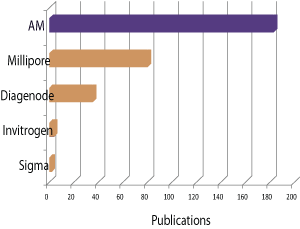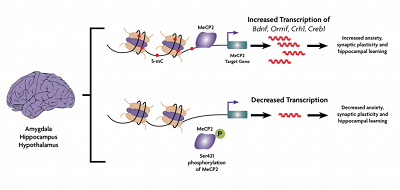<< Back to Targets & Applications Home Page
New to Neuroepigenetics? We Can Help.
There is increasing evidence that several neurodevelopmental, neurodegenerative and psychiatric disorders are, in part, caused by aberrant epigenetic modifications. As a result, researchers in neurogenetics are now beginning to investigate the mechanisms underlying epigenetic regulation in neuronal gene expression and how this impacts normal brain function. The transition into epigenetics research does not have to be intimidating because there are an increasing number of tools available to help researchers obtain their desired results.
Epigenetics Modifications in Neurons

In recent years, there has been a rapid increase in the number of publications suggesting a role for epigenetics in regulating the Central Nervous System (CNS) and a growing body of evidence linking epigenetic mechanisms to neural plasticity and CNS disorders, such as schizophrenia and drug addiction. More than a dozen neurological syndromes so far have been linked to mutations in single genes that encode DNA methyltransferase and histone modifying enzymes. This list includes neurological disorders that appear in early childhood (Rett syndrome) or later in life, such as Hereditary Sensory and Autonomic Neuropathy Type 1 (HSAN1).
The Epigenetics Tool Kit

The development of methods such as chromatin immunoprecipitation (ChIP) and DNA methylation enrichment techniques, along with Next-Generation Sequencing tools, is allowing researchers to get a better picture of the genome-wide changes associated with neurological and other diseases. There are a number of techniques that are key to epigenetic analysis. These include:
- Antibodies to discriminate between the multiple post-translational modifications on the histone tails, and to detect methylated DNA
- ChIP and ChIP-Seq techniques to enable scientists to link specific states of chromatin to individual gene loci in a cell to understand how genes are regulated
- Enrichment methods for isolation of methylated DNA variants (5-methylcytosine, or 5-mC, and 5-hydroxymethylcytosine, or 5-hmC)
- Bisulfite conversion of methylated DNA prior to sequencing to allow detection of methylated cytosines
Epigenetic techniques require validated antibodies

One of the greatest challenges for epigenetic-based research has been the lack of antibodies that show proper specificity yet have been validated for use in techniques such as ChIP and ChIP-Seq. Histones have multiple post-translational modifications along the so-called tail portion of the protein that appear to be involved in gene regulation and disease. Antibodies need to be able to clearly differentiate between these multiple small modifications. It is a major challenge to develop antibodies with sufficient specificity that will also perform in demanding techniques such as ChIP. Active Motif has established a validation program for its antibodies to qualify them for their intended use. This includes ChIP-Seq testing, ChIP validation, as well as a test on the specificity of our histone antibodies with a unique Modified™ Histone Peptide Array (Catalog No. 13001). For the full list of our epigenetics antibodies please visit us here.
Active Motif has the right tools for ChIP
ChIP is a technically challenging method. Numerous factors can cause it to fail, so researchers who are not experts in the techniques are best served using well-validated and reliable kits to perform these assays. Active Motif has developed a number of kits and accessory reagents tailored to help the researcher with their ChIP experiments. We provide all the critical components needed in a single kit, along with easy to follow instructions. These kits and associated antibodies have been used in hundreds of labs and cited in over 1,000 papers in peer-reviewed journals. For the full list of kits and reagents for ChIP, please visit us here.

What is the role of DNA methylation in brain function?
DNA methylation of genes is found in all human tissues, including the brain. There are several methylation variants, and one of these, 5-hmC, is highly expressed in the brain relative to other parts of the body. This has led to speculation that 5-hmC may have a unique biological role in the CNS. Furthermore, recent studies have shown a correlation between DNA methylation levels and mental health problems, such as anxiety and depression. In addition, mutations in genes involved in DNA methylation (e.g. MeCP2) are linked to neurological diseases. However, the mechanism by which DNA methylation exerts these effects is not fully understood.
Active Motif has the tools for DNA methylation analysis
Active Motif offers a number of products specific for this area of research, including kits and antibodies that enrich for DNA fragments that contain 5-mC and 5-hmC. Many of our DNA methylation antibodies have been validated for use in ChIP, methylated DNA immunoprecipitation (MeDIP) and/or immunofluorescence. For complete details on all of our DNA methylation products, please visit us here.

Let Active Motif do the work for you
Reproducibly generating high quality, interpretable data from ChIP experiments can be challenging, as it requires prior knowledge of working antibodies, optimized protocols for various cell types and knowledge of cell type-specific binding sites. Add in the technical and bioinformatics challenges associated with generating whole-genome data sets, and ChIP-Seq may be beyond your reach. Our Epigenetic Services team provides a wide variety of ChIP services, making it possible for you to utilize our expertise and research tools without having to be an expert in the techniques yourself. To find out more, or to get a quote, visit our services page.



